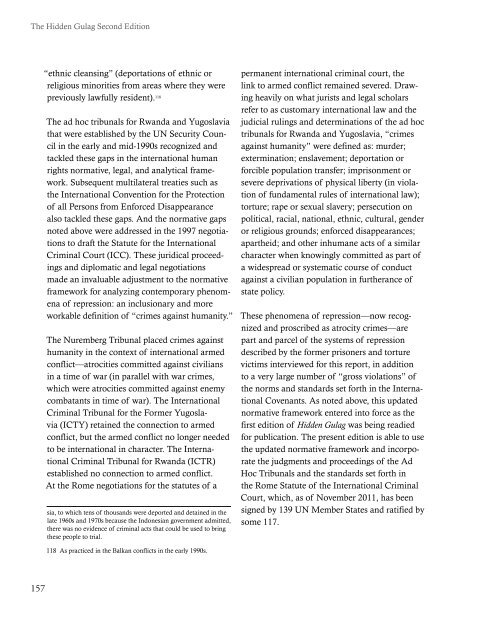The Hidden Gulag - US Committee for Human Rights in North Korea
The Hidden Gulag - US Committee for Human Rights in North Korea
The Hidden Gulag - US Committee for Human Rights in North Korea
You also want an ePaper? Increase the reach of your titles
YUMPU automatically turns print PDFs into web optimized ePapers that Google loves.
<strong>The</strong> <strong>Hidden</strong> <strong>Gulag</strong> Second Edition“ethnic cleans<strong>in</strong>g” (deportations of ethnic orreligious m<strong>in</strong>orities from areas where they werepreviously lawfully resident). 118<strong>The</strong> ad hoc tribunals <strong>for</strong> Rwanda and Yugoslaviathat were established by the UN Security Council<strong>in</strong> the early and mid-1990s recognized andtackled these gaps <strong>in</strong> the <strong>in</strong>ternational humanrights normative, legal, and analytical framework.Subsequent multilateral treaties such asthe International Convention <strong>for</strong> the Protectionof all Persons from En<strong>for</strong>ced Disappearancealso tackled these gaps. And the normative gapsnoted above were addressed <strong>in</strong> the 1997 negotiationsto draft the Statute <strong>for</strong> the InternationalCrim<strong>in</strong>al Court (ICC). <strong>The</strong>se juridical proceed<strong>in</strong>gsand diplomatic and legal negotiationsmade an <strong>in</strong>valuable adjustment to the normativeframework <strong>for</strong> analyz<strong>in</strong>g contemporary phenomenaof repression: an <strong>in</strong>clusionary and moreworkable def<strong>in</strong>ition of “crimes aga<strong>in</strong>st humanity.”<strong>The</strong> Nuremberg Tribunal placed crimes aga<strong>in</strong>sthumanity <strong>in</strong> the context of <strong>in</strong>ternational armedconflict—atrocities committed aga<strong>in</strong>st civilians<strong>in</strong> a time of war (<strong>in</strong> parallel with war crimes,which were atrocities committed aga<strong>in</strong>st enemycombatants <strong>in</strong> time of war). <strong>The</strong> InternationalCrim<strong>in</strong>al Tribunal <strong>for</strong> the Former Yugoslavia(ICTY) reta<strong>in</strong>ed the connection to armedconflict, but the armed conflict no longer neededto be <strong>in</strong>ternational <strong>in</strong> character. <strong>The</strong> InternationalCrim<strong>in</strong>al Tribunal <strong>for</strong> Rwanda (ICTR)established no connection to armed conflict.At the Rome negotiations <strong>for</strong> the statutes of asia, to which tens of thousands were deported and deta<strong>in</strong>ed <strong>in</strong> thelate 1960s and 1970s because the Indonesian government admitted,there was no evidence of crim<strong>in</strong>al acts that could be used to br<strong>in</strong>gthese people to trial.permanent <strong>in</strong>ternational crim<strong>in</strong>al court, thel<strong>in</strong>k to armed conflict rema<strong>in</strong>ed severed. Draw<strong>in</strong>gheavily on what jurists and legal scholarsrefer to as customary <strong>in</strong>ternational law and thejudicial rul<strong>in</strong>gs and determ<strong>in</strong>ations of the ad hoctribunals <strong>for</strong> Rwanda and Yugoslavia, “crimesaga<strong>in</strong>st humanity” were def<strong>in</strong>ed as: murder;exterm<strong>in</strong>ation; enslavement; deportation or<strong>for</strong>cible population transfer; imprisonment orsevere deprivations of physical liberty (<strong>in</strong> violationof fundamental rules of <strong>in</strong>ternational law);torture; rape or sexual slavery; persecution onpolitical, racial, national, ethnic, cultural, genderor religious grounds; en<strong>for</strong>ced disappearances;apartheid; and other <strong>in</strong>humane acts of a similarcharacter when know<strong>in</strong>gly committed as part ofa widespread or systematic course of conductaga<strong>in</strong>st a civilian population <strong>in</strong> furtherance ofstate policy.<strong>The</strong>se phenomena of repression—now recognizedand proscribed as atrocity crimes—arepart and parcel of the systems of repressiondescribed by the <strong>for</strong>mer prisoners and torturevictims <strong>in</strong>terviewed <strong>for</strong> this report, <strong>in</strong> additionto a very large number of “gross violations” ofthe norms and standards set <strong>for</strong>th <strong>in</strong> the InternationalCovenants. As noted above, this updatednormative framework entered <strong>in</strong>to <strong>for</strong>ce as thefirst edition of <strong>Hidden</strong> <strong>Gulag</strong> was be<strong>in</strong>g readied<strong>for</strong> publication. <strong>The</strong> present edition is able to usethe updated normative framework and <strong>in</strong>corporatethe judgments and proceed<strong>in</strong>gs of the AdHoc Tribunals and the standards set <strong>for</strong>th <strong>in</strong>the Rome Statute of the International Crim<strong>in</strong>alCourt, which, as of November 2011, has beensigned by 139 UN Member States and ratified bysome 117.118 As practiced <strong>in</strong> the Balkan conflicts <strong>in</strong> the early 1990s.157



